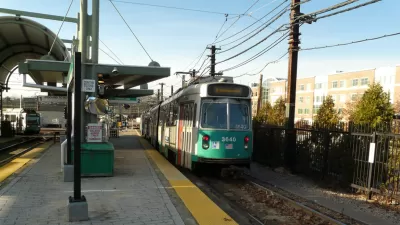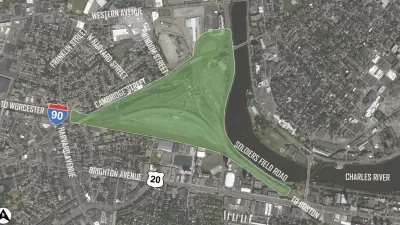This week, the Massachusetts Department of Transportation (MassDOT) announced how it aims to spend $12.4 billion on road and transit projects over the next five years. Expansions of Boston's Fairmount Indigo Line and Green Line are planned.

"On Thursday afternoon, MassDOT released its Capital Investment Plan for 2014 through 2018, which is an outline of how state officials plan to spend money, trying to fix the problems that plague pedestrians, cyclists, commuters, and drivers," reports Steve Annear. Though many of the projects outlined in the plan have been in the works for years, one bold initiative highlighted by Annear is the expansion of the 9.2-mile Fairmount Indigo Line.
Though the line passes through some of the densest areas of Boston, it has the lowest ridership of any commuter rail service in the city. In addition to new stations along the line that are currently under construction, the Capital Plan envisions an ambitious expansion of the Indigo Line. "According to a map produced by MassDOT as part of the report, the Indigo Line would expand in the next decade and make loops into Fort Point, near the Convention Center, as well as provide trips to Back Bay, and introduce a connector that could swing into Cambridge before making its way to North Station from Allston," explains Annear.
Though 53 percent of the $12.4 billion would be spent on highways, officials are planning to spend $130 million on improving bicycle infrastructure by 2018.
Of note, adds Martine Powers in the Boston Globe, "If efforts are successful to repeal the automatic gasoline tax hikes in a November ballot question, the resulting lower tax revenue could derail some of the transportation projects."
FULL STORY: Take A Ride On The MBTA’s ‘New Indigo Line’ In 2024

Maui's Vacation Rental Debate Turns Ugly
Verbal attacks, misinformation campaigns and fistfights plague a high-stakes debate to convert thousands of vacation rentals into long-term housing.

Planetizen Federal Action Tracker
A weekly monitor of how Trump’s orders and actions are impacting planners and planning in America.

Chicago’s Ghost Rails
Just beneath the surface of the modern city lie the remnants of its expansive early 20th-century streetcar system.

Bend, Oregon Zoning Reforms Prioritize Small-Scale Housing
The city altered its zoning code to allow multi-family housing and eliminated parking mandates citywide.

Amtrak Cutting Jobs, Funding to High-Speed Rail
The agency plans to cut 10 percent of its workforce and has confirmed it will not fund new high-speed rail projects.

LA Denies Basic Services to Unhoused Residents
The city has repeatedly failed to respond to requests for trash pickup at encampment sites, and eliminated a program that provided mobile showers and toilets.
Urban Design for Planners 1: Software Tools
This six-course series explores essential urban design concepts using open source software and equips planners with the tools they need to participate fully in the urban design process.
Planning for Universal Design
Learn the tools for implementing Universal Design in planning regulations.
planning NEXT
Appalachian Highlands Housing Partners
Mpact (founded as Rail~Volution)
City of Camden Redevelopment Agency
City of Astoria
City of Portland
City of Laramie




























